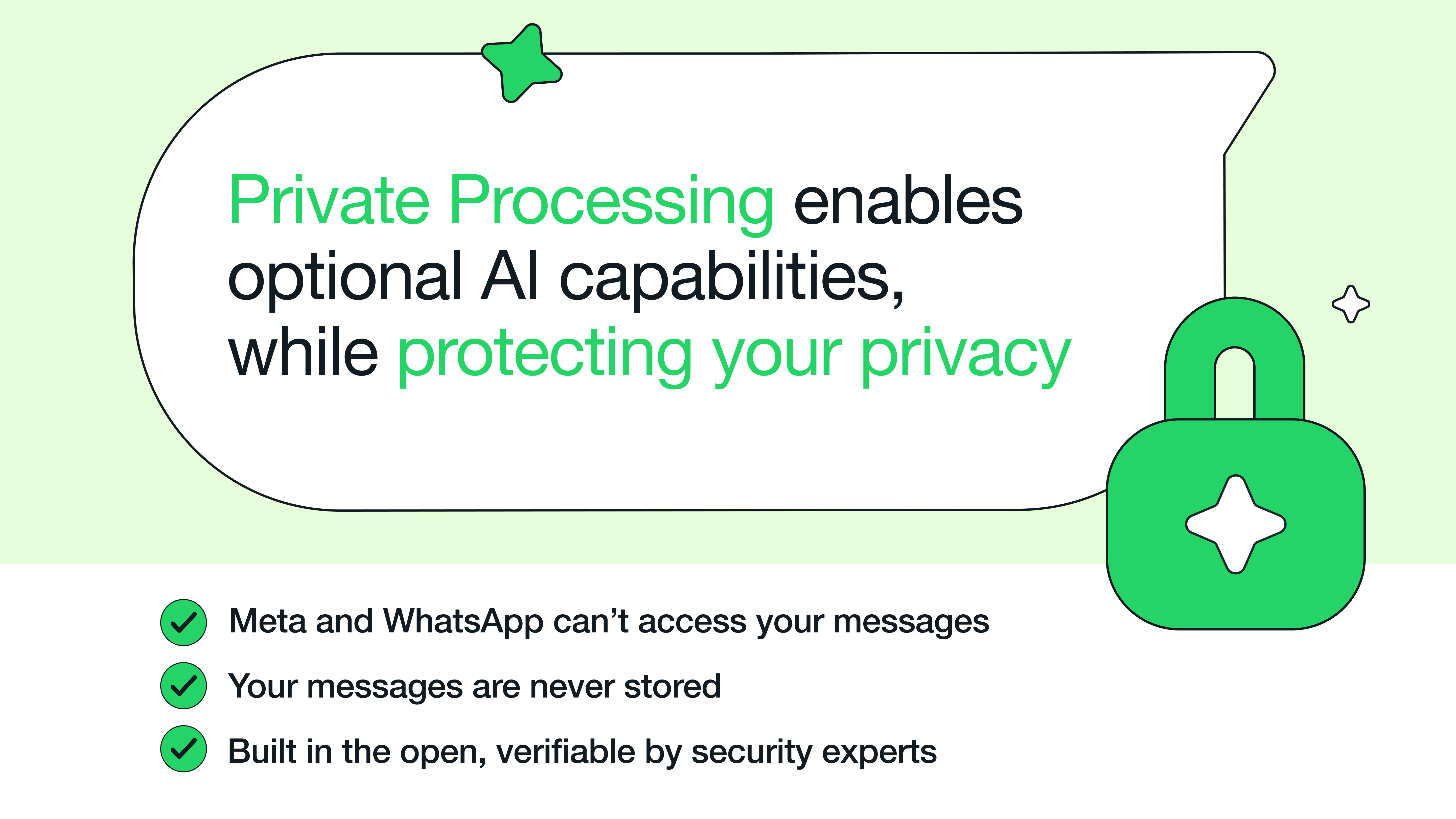WhatsApp is taking an interesting step toward the future with something they call “Private Processing”—a new technology that enables advanced AI features without compromising your privacy. How does it work? Essentially, some heavy tasks are offloaded to highly secure cloud servers, without anyone being able to see what you're typing.
This is crucial for features like summarizing long conversations or offering writing suggestions—things your phone alone might not handle easily.
Best of all, this feature doesn’t turn on by itself: it’s completely optional. You decide if and when you want to use it. For now, Private Processing isn’t available to everyone yet, but WhatsApp will gradually roll it out over the coming weeks.

How Does Private Processing Work in WhatsApp?
If you choose to enable Private Processing in WhatsApp, the entire system is designed to protect your identity and data from the very beginning.
First, your WhatsApp app anonymously verifies that you're a valid user—without revealing who you are. Then, your device obtains special encryption keys from a content delivery network (CDN) that is not owned by Meta. Why does that matter? Because it prevents Meta from linking your request to your identity. Your anonymity stays protected.
Next, your phone connects to Meta’s servers—but not directly. Instead, the connection goes through a sort of “relay” that hides your IP address, so no one can know where you're connecting from.
At that point, a highly secure connection is established between your device and what's called a Trusted Execution Environment (or TEE). This is a space within Meta’s servers that is completely isolated from the rest of the system—think of it like a digital vault.
Your AI request, already end-to-end encrypted, enters this environment using a unique key that only your phone and the TEE know. Everything that happens inside—like generating smart replies or summarizing messages—takes place without Meta being able to see anything. Once processing is complete, the response is encrypted again and sent back to your device, where it’s decrypted for you to view.
Meta claims that this secure environment retains no personal data: everything is wiped after processing, and only non-identifiable technical metrics are kept. Additionally, Meta has committed to publishing portions of the code and systems used, allowing independent experts to audit and verify that privacy promises are truly being upheld.
Private Processing is just one pillar of WhatsApp’s broader AI privacy approach. There are several equally important principles that help ensure AI-powered features remain safe and trustworthy:
- Enforceable Privacy Guarantees: If anyone tries to tamper with how the privacy system works, it either shuts down or triggers visible alerts. There’s no way to secretly alter it without detection.
- Verifiable Transparency: Anyone—from curious users to independent researchers—can examine how the system behaves to make sure it does exactly what it claims to, and nothing more.
- Impossible to Target Individuals: The system is designed to make it technically impossible to focus surveillance or attacks on a specific user. Doing so would break the entire security architecture.
- No History, No Data Retention: Once a message is processed, it disappears. Nothing is stored on servers or in logs. This ensures that even if someone accessed the system, they couldn't recover past requests.
Privacy Concerns
Even though Meta assures that everything is locked down in terms of security and data protection, it’s natural to have concerns when your information is being sent outside your phone to be processed in the cloud.
No matter how strong the encryption is, there’s always a small risk involved when data leaves your device. That’s something that can’t be entirely avoided, and it’s important to keep in mind. If you’re not fully comfortable with how Private Processing works, that’s totally fine—the feature is turned off by default, and you can simply leave it that way.
That said, if you’re interested in taking advantage of advanced AI features (like automatic summaries or smart replies) but still want full control over when and how your data is used, then WhatsApp’s recently launched “Advanced Chat Privacy” option might be your best bet. It gives you greater control without having to give up on the benefits of new technology.


